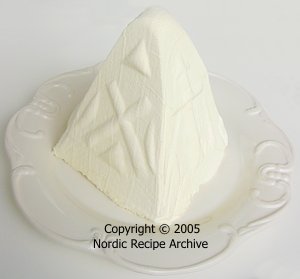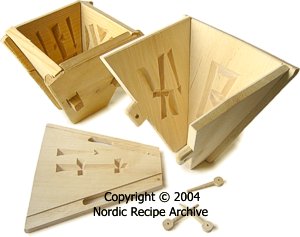
|
|
| MAIN RECIPE PAGE |
|
|
PASKHA
The ingredients are mixed together — sometimes heated without boiling — and poured into a special wooden or plastic pyramid-shaped paskha mould lined with cheesecloth (see the picture below). The mould is placed in cold for the mixture to set before unmoulding. Paskha is eaten spread on a slice of traditional sweet yeast bread kulich. Sometimes paskha can be flavoured with chocolate, nuts, raisins, candied citrus peel or dried fruit, although a "real", authentic paskha never contains these flavourings.
On Easter Sunday, when the fast has ended, it is again allowed to eat these "forbidden" ingredients and this is why many of the Russian Easter dishes contain lots of eggs, butter, cream, etc. In old agrarian society, making paskha was a way of using up all the eggs and dairy products that had piled up during the fast. See a recipe for paskha. |
|
|
 Paskha — pronounced [PAHS-khuh] (stress on the first syllable), or [ˈpasha] (using
Paskha — pronounced [PAHS-khuh] (stress on the first syllable), or [ˈpasha] (using  During the great Easter fast of the Orthodox church, it is forbidden to eat meat, eggs, butter or other dairy products.
During the great Easter fast of the Orthodox church, it is forbidden to eat meat, eggs, butter or other dairy products.